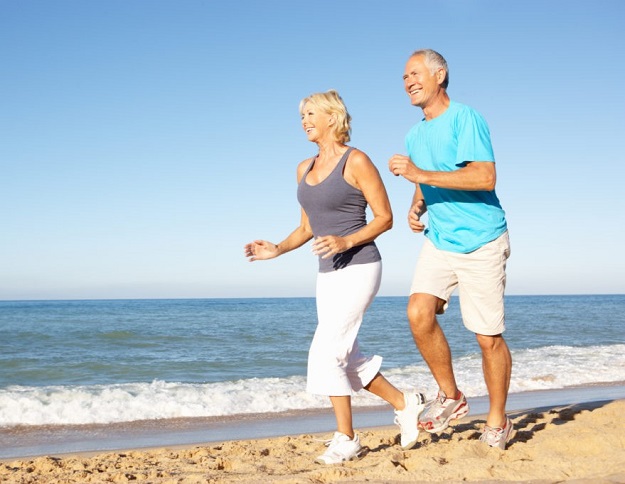
People over 50 can speed up their metabolism by making some simple lifestyle changes. And these habits will have other positive impacts on your health. Follow these simple tips to encourage your body into having a faster metabolism:
Utilize Strength Training
Maintaining muscle tone is one of the most important things we can do to burn more calories. For elderly people, starting or maintaining a strength-training program can help increase their basal metabolic rate.
Strength training is also good for losing the belly. Research in the Journal of Obesity confirmed that weight loss for seniors has the most significant positive impact on health if it comes from the abdominal region. And the fat loss from strength training is often from this area.
Plus, strength training doesn’t have to be intimidating or time-consuming. If you’re not currently lifting weights (or doing other strength-building exercises such as yoga), talk to your doctor about creating a plan that works for you. The National Institute on Aging website shows some simple exercises for seniors that can act as a good starting point.
Remember: You’re never too old to improve your muscle tone. You can build muscle after 60 by doing strength-training exercises. In fact, it’s possible to strengthen your muscles well into your 90s.
Add More Movement
You can also enjoy the benefits of physical activity without heading to the gym. As we get older, we tend to be more sedentary throughout the day. Research has confirmed that older people move less, on average, just doing everyday tasks. That’s unfortunate because even light amounts of activity can help your metabolism and cardiovascular health.
However, in today’s automated world, we have fewer opportunities for this kind of movement. So, look for every chance you can to get some extra light movement. For example, gardening, doing the dishes by hand, and putting away the laundry are the kinds of tasks that keep your body moving. Walking is considered an excellent exercise to help seniors lose weight. And you don’t have to get the often-cited 10,000 steps a day to benefit, even a small increase in the number of steps you take each day can help.
Eat Protein
Protein can help build muscle. It also requires more energy to digest. That means you can boost your metabolism after 60 by eating lean protein with every meal to prevent muscle loss. Seniors who eat adequate protein are less likely to lose the ability to do everyday, functional activities such as dressing and walking up stairs.
It’s generally preferable to get your protein from whole foods, so you don’t miss out on other essential elements of a healthy and affordable diet. Many people have trouble meeting their optimal protein intake through whole foods alone. A good quality protein powder can help fill in the gaps.
Some store-bought meal replacement shakes are handy when you’re busy or not feeling hungry, but they are often high in sugar and unnecessary additives. If you need extra calories and overall nutrition, higher-protein meal replacement shakes could be a good tool. But if you’re looking to supplement protein without adding anything else, a high-quality protein powder is likely a better choice.
Consume Enough Calories
This may seem like an odd tip. After all, many fad diets require dieters to drastically cut the calories they consume. And you’ve probably heard that the secret to losing weight is eating fewer calories.
However, a low-calorie strategy can backfire, particularly for seniors. When our bodies sense that they aren’t getting enough energy to meet our basic needs, our metabolism can go into “starvation mode” to conserve energy. We can probably thank evolution for this. Before we had access to supermarkets and fast food, hunger was often a signal that food was in short supply.
You can also lose weight too quickly if you don’t get enough calories, which can lead to muscle loss. And you need to maintain muscle for a healthy metabolism. Unfortunately, many elderly people find it difficult to eat enough food. For seniors, several factors can contribute to reduced appetites, including changes to their sense of smell or taste.
If you struggle to eat regular, balanced meals because you don’t have much of an appetite, talk with your doctor. At first, a reduced appetite might seem like a bonus for weight loss. For seniors, however, it can signal health issues that should be checked out.
Get Enough Sleep
Seniors often struggle to get enough sleep. But missing out on sleep is another habit that can harm your metabolism. And research has linked sleep deprivation with a greater likelihood of obesity for older adults.
Reduce Stress
When you’re under chronic pressure, your body can interpret your stressed-out state as a sign that you need to conserve energy. And the “flight or fight” response created by stress hormones like cortisol can trigger glucose production because our bodies think we might need the energy. The results can impact your metabolism, in addition to triggering cravings for sweets. Although more research is needed, some studies suggest that meditation can reduce stress and help with overall health.
Related Articles & Free Vermont Maturity Subscription

Exercises that Help Ease Arthritis Pain and Stiffness
Managing Your Food Leads to Better Energy






Comment here